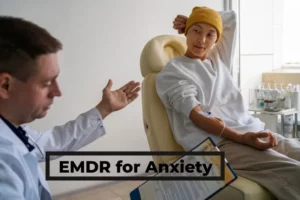Introduction
In today’s world, experiencing trauma and overwhelming stress is highly common. We learn to consciously and unconsciously apply different thoughts and behaviors to manage these stressors. These are known as coping mechanisms, and depending on their nature and long-term effects, they can be either healthy or unhealthy. Alcohol dependence is a type of unhealthy coping mechanism.
Healthy coping mechanisms, such as exercise or mindfulness, help us deal with challenging situations and emotions in a constructive way, which further helps us make positive, long-term changes in life.
However, dealing with a traumatic or stressful situation takes time. Suppose we are not patient in processing it and committed to making healthy changes. In that case, we may end up seeking immediate and temporary relief to escape the discomfort, such as binge eating or abusing substances when feeling emotionally overwhelmed. These are known as unhealthy coping mechanisms, and they have a negative impact on our well-being in the long term.
Alcohol dependence is a highly prevalent unhealthy coping mechanism across the world, with up to 3 million people dying every year due to alcohol abuse.[1]
What is alcohol dependence?
Drinking alcohol to deal with emotional distress is known as alcohol dependence. It is both a physical and psychological dependence. This dependence is characterized by continued drinking despite experiencing negative effects. Excessive alcohol use can result in changes in the structure and functioning of the brain.
A combination of genetic, environmental, and social factors causes alcohol dependence. [2] Individuals with a parent or close relative with alcohol dependency are three to four times more likely to develop it themselves. Severe childhood trauma also significantly increases the risk of developing alcohol addiction. The glamorous portrayal of drinking in the media not only sends the message to youth that it’s okay to drink too much but also encourages them to do so.
While the Diagnostic and Statistical Manual of Mental Disorders (DSM) IV described two distinct disorders, alcohol abuse and alcohol dependence, the DSM–5 integrates the two into a single disorder called alcohol use disorder (AUD) with mild, moderate, and severe sub-classifications. [3]
Stages of alcohol dependence

Alcohol dependence or addiction occurs in three stages: [4]
Stage 1: Binge drinking
The person experiences the rewarding effects of alcohol, such as euphoria and ease in social interactions. With repeated consumption of alcohol, the basal ganglia, which play an important role in forming habits, are activated, which further reinforces the drinking behavior.
Stage 2: Withdrawal
The person tries to take a break or stop drinking alcohol and experiences negative effects, which are opposite to the ones they experienced initially. Physically, they may feel like they’re falling ill and experience disturbances in their sleep. Mentally, they may feel more irritated and anxious. At this stage, the person may continue drinking alcohol not for the pleasurable effects but to escape the negative effects they’re experiencing.
Stage 3: Anticipation
During this stage, the person finds themselves preoccupied with thoughts of wanting to drink alcohol and actively waiting to drink again. The prefrontal cortex of the brain is affected at this stage of alcohol dependence, resulting in executive functioning challenges such as being unable to organize thoughts, perform tasks and responsibilities, manage time, and make decisions.
Therapy for alcohol dependence
There are a variety of effective therapies and treatments for alcohol dependence. Some commonly used therapies are:
- Cognitive behavioral therapy (CBT): CBT is used to help individuals understand and unlearn their maladaptive behaviors related to their alcohol consumption. Through functional analysis, individuals can learn what triggers them to cope using alcohol and situations that they have difficulties dealing with. Followed by skills training, the individual learns to tolerate distress in a triggering situation and re-learns what they can do instead to cope more healthily. [5]
- Motivational interviewing (MI): Through MI, individuals overcome their ambivalence about changing their drinking behaviors and identify their reasons for making changes, thus increasing the motivation to implement these changes. [6]
- Group therapy: In this form of therapy, individuals with a common problem of alcohol dependency come together under the guidance of a therapist who facilitates goal-oriented discussions and therapeutic techniques. What makes this therapy effective is that it gives individuals a sense of community as they can relate to each other’s struggles as well as successes. There are different types of group therapies, such as educational groups, skill development groups, as well as support groups like Alcoholics Anonymous ( AA). [7]
- Family therapy: Alcohol dependence not only affects the person with the addiction, it also affects their family members. Hence, family therapy focuses on healing all members of the family and is especially helpful when there are co-occurring disorders within the family. Family behavioral therapy (FBT) and multisystemic therapy are effective family therapies used to treat alcohol dependence.
- Healthcare professional: Only a healthcare professional is best qualified to recommend the right course of treatment for an individual with alcohol dependency. While therapy is an effective option for treatment, it may be used in conjunction with medication and a setting such as a rehabilitation center, depending on the severity of the dependence.
Five important tips for therapy for alcohol dependence
- The key tip is to be committed to making healthy changes in your life. For this, make it a point to show up for therapy regularly.
- Continue to create more awareness around your triggers and proactively apply the new healthy coping strategies in your life that you’re taught in therapy.
- Along with therapy, employ self-help strategies such as evaluating the costs and benefits of drinking. This will help you quit drinking effectively and stay motivated to be sober.
- If you experience withdrawal, practice taking good care of yourself by getting adequate sleep, eating healthy food, exercising, meditating, and talking to friends and family.
- It is also important to seek social recovery support through groups such as AA as they can give you a boost of strength and motivation to stay on track.
Conclusion
Alcohol dependence can cause serious detriment to an individual’s and their close ones’ well-being. AUD is considered a physical as well as a psychological disorder. It is possible to effectively treat alcohol addiction through a combination of therapy, medication, and social support. If you or someone you know is suffering from alcohol dependence, consider seeking professional help immediately. Book a session with one of our mental health experts at United We Care, who can help you develop healthier coping strategies for your stressors.
References:
[1] Drug Abuse Statistics, “Alcohol Abuse Statistics.” [Online]. Available: https://drugabusestatistics.org/alcohol-abuse-statistics/. Accessed: Dec. 15, 2023.
[2] Mayo Clinic, “Alcohol use disorder: Symptoms & causes.” [Online]. Available: https://www.mayoclinic.org/diseases-conditions/alcohol-use-disorder/symptoms-causes/syc-20369243. Accessed: Dec. 15, 2023.
[3] National Institute on Alcohol Abuse and Alcoholism (NIAAA), “Alcohol Use Disorder: A Comparison Between DSM.” [Online]. Available: https://www.niaaa.nih.gov/publications/brochures-and-fact-sheets/alcohol-use-disorder-comparison-between-dsm. Accessed: Dec. 15, 2023.
[4] National Institute on Alcohol Abuse and Alcoholism (NIAAA), “The Cycle of Alcohol Addiction.” [Online]. Available: https://www.niaaa.nih.gov/publications/cycle-alcohol-addiction. Accessed: Dec. 15, 2023.
[5] R. Kathryn McHugh, Bridget A. Hearon, and Michael W. Otto, “Cognitive-Behavioral Therapy for Substance Use Disorders,” in Psychiatric Clinics of North America, vol. 33, no. 3, pp. 511-525, 2010. [Online]. Available: https://www.ncbi.nlm.nih.gov/pmc/articles/PMC2897895/. Accessed: Dec. 15, 2023.
[6] Adeline Nyamathi, Steven Shoptaw, Allan Cohen, Barbara Greengold, Kamala Nyamathi, Mary Marfisee, Viviane de Castro, Farinaz Khalilifard, Daniel George, and Barbara Leake, “Effect of Motivational Interviewing on Reduction of Alcohol Use,” in Drug and Alcohol Dependence, vol. 107, no. 1, pp. 23-30, 2010. [Online]. Available: https://www.ncbi.nlm.nih.gov/pmc/articles/PMC3383096/. Accessed: Dec. 15, 2023.
[7] Alcohol Rehab Guide, “Group Therapy for Alcoholism.” [Online]. Available: https://www.alcoholrehabguide.org/treatment/group-therapy/. Accessed: Dec. 15, 2023.
[8] HelpGuide, “Overcoming Alcohol Addiction.” [Online]. Available: https://www.helpguide.org/articles/addictions/overcoming-alcohol-addiction.htm. Accessed: Dec. 15, 2023.










